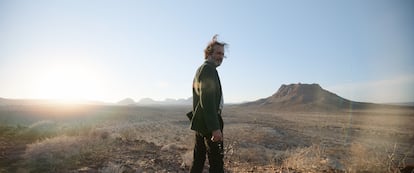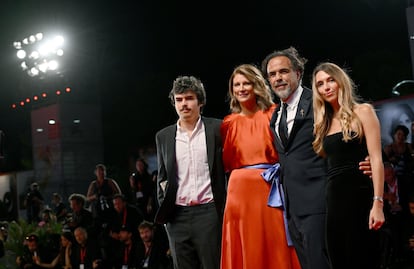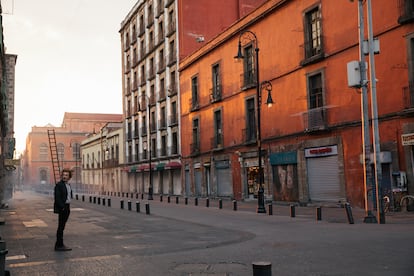Alejandro G. Iñárritu: ‘To migrate is to die a little’
The Mexican filmmaker defends ‘Bardo’, his most personal movie, after the harsh criticism he received at the Venice Film Festival


Bardo, the seventh film by the Oscar-winning Mexican director Alejandro González Iñárritu, is full of “Easter eggs” – obscure references to past works, hidden throughout the film like secret little treats. Bardo, False Chronicle of a Handful of Truths (the work’s full title) has echoes of Amores Perros, Birdman, The Revenant, and even Detrás del dinero (Behind the Money), a TV series Iñárritu co-directed with Pelayo Gutiérrez in 1995. Iñárritu’s new movie, a three-hour-long work of autofiction, is an intimately personal project – a kind of distillate of its creator’s own selfhood.
Iñárritu discussed the intricacies of his latest, and most personal, film during a recent long-distance interview with EL PAÍS. The film is a work of great maturity, and a reflection on the identity and experience of someone who, like Iñárritu, has left his country for the United States. It is also a portrait of a person who cannot help but see success through the lens of uncertainty. Iñárritu attended the San Sebastián International Film Festival in northern Spain in September to celebrate the premiere of a new cut of the film. “These films need time,” says Iñárritu. Bardo will play in select theaters in October, and will be available for streaming on Netflix on December 16.
Question. The Chilean writer Benjamín Labatut has said that Bardo is not an autobiography, but rather a succession of mental states.
Answer. That’s a good interpretation. I’ve always said that Mexico is not a country; it’s a state of mind. When you leave a country, your involuntary memory becomes your richest source of imagination. That uncertainty of sensations, feelings, memories, fears and illusions is the foundation of Bardo. I tried to put all these impulses in order. Or at least to give them a sense of meaning the only way I know how, which is through images and cinema. I wouldn’t call it a film with a coherent or traditional structure. My sense is that they’re traces of memory.
Q. After Biutiful, you said that you were feeling somewhat tired of conventional narratives. It seems like critics are judging Bardo based on ideas of a certain traditional model of storytelling.
A. You make some films for the public, and with others you have the luxury of making them for yourself out of a vital or existential need. Bardo is one of those films. Sometimes you make films not to reaffirm conventions, but to break them. There’s an implicit risk in what we’re doing; there’s no recipe to follow. These films need time, in contrast to what we now call “content” – consumer products, structures, genres and tones that are already well understood within an industry. This film obeys another set of rules.
Q. You’ve said that to make a film without fear is an exercise in banality. That fear is an ally. What were your fears in making Bardo?
A. To open the cellar of one’s own history is always terrifying. It’s also useless. To make a film is useless. So is to dream. All of this is useless except for those who do it. Then, doing it becomes an essential, life-affirming act. What I realized over the years is that the narratives that bind together entire countries, the stories we’re instilled with from childhood, are always interpreted through our nervous system. They’re built into us. They give us identity, a sense of belonging and collective power. When you leave, you start to see these narratives in perspective, and with time and distance they dissolve. Your own experiences and relationships, your feelings of affection toward your parents, your friends, your country. The stories our mind weaves start to unravel, to be questioned, and everything becomes uncertain. This is why the main character says that memory has no truth, only emotional conviction. This is the most complicated and delicate part. I don’t remember my childhood; I have no images of those years. I envy anyone who can build a narrative of their life, and find their reason for existing, from there – from the beginning of everything. For me, it’s the other way around. It’s perhaps the past 25 years of my life where I might find some clues about what my early years were like. And that’s what I’m doing. These are the questions I ask myself, that have no answers.

Q. During filming, you were considering Limbo as a title. At what point did you decide to change it to Bardo?
A. They’re similar concepts. One from Catholicism, where limbo is a place for the souls of infants and small children who die before being baptized and are thus denied entry into heaven. That’s a bit reductive. But bardo is a similar concept in the Buddhist tradition – a state in which all things are in constant transition. We die and are reborn all the time. For me, to migrate is to die a little. It implies a certain acceptance of the end of something, of being reborn again and of reinventing yourself. That integration into a new culture implies the disintegration of what came before. That’s the bardo I’m talking about. And in the end, the final migration, which is inevitable and touches us all: death. At my age, you start to think about it. It makes you laugh, makes you reassess, forces you to try to put things in order.
Q. You mentioned your childhood. In one scene, the protagonist, who has become a child, encounters his father in the bathroom at a dancehall. His father tells him that success is something you should only take a little taste of, and then spit it out, because otherwise it poisons you.
A. That’s literally something my father said. He always maintained a very guarded attitude toward success, something he never experienced himself. I used it because it’s something that stuck with me. With my father, there was never really any praise. Not because he had bad intentions; he just thought that reinforcing someone’s successes or virtues might make that person believe it so much that they’d stop doing what they did naturally. The character, in one part of the film, is grappling with his own mind. The first 25 minutes are about him, his award, his interview. Then it gets diluted and becomes a film about the heart. For me, Bardo is full of humor, moving between the sublime and the stupid, the ridiculous and the painful, just like life. It’s not a dive into obscurities, but a glide over the surface.

Q. You opt for catharsis in all of your projects. Was that the case here?
A. For me it was a compulsory exercise because of my age and my need to free myself, and thus to be able to share, without filters or disguises, a very fragile mental and emotional state that’s difficult to articulate in words. If I had been a painter, I would have painted a self-portrait, which is always a well-received endeavor. Or a maximalist mural in the vein of [José Clemente] Orozco. But I don’t know how to paint. And words? Only writers like Octavio Paz or Jorge Luis Borges, or Rulfo, [Julio] Cortázar, César Vallejo – only they were able to make sense of the nonsense. With those talents far out of my reach, I stuck to what I could do with the 32 cinematographic sequences that make up this film.
I think those of us who have this experienced share something that’s difficult to speak about. Those of us who have left, even if we return to our country, we can never return. There’s no going back. This is a feature of the hybrid culture that very much defines our times. For those who have not left – in this case, people from the United States, who are culturally self-contained and speak a language that’s spoken all over the world – this can be difficult to understand.

Q. You met Guillermo del Toro when he came to help you edit Amores Perros and suggested that you cut the film down. That it was 20 minutes too long. In Venice, Bardo received a lot of criticism for being three hours long. Do you think this criticism is unfair?
A. I think some one-hour movies are totally unbearable and way too long. And then there are films that are three and a half hours long and they’re some of my favorites. This kind of thinking seems superficial to me. There’s an obsession with runtime or the box office, as if these things were important. Editing a film is an endless process. It’s like editing a book. Rulfo spent nearly 17 years editing Pedro Páramo, an audacious process of extraction. It’s always hard to know where the final waters of a film will flow. My processes are long. In fact, with a lot of my films I’ve made edits up to the very last minute. I was making little tweaks to 21 Grams until the day it premiered. You let a film go because of a deadline, like a festival or a premiere. In this case, with Bardo, I finished the film two days before I left for Venice. I’m very happy to say that I’m just now incorporating some extra scenes that weren’t finished in time for the premiere. I also tightened up the internal rhythm of a few other scenes. The essence of the film is intact, but I had the opportunity to put a final touch on it, to do a little acupuncture. I’m very rigorous. I’m a butcher. I share that with Guillermo del Toro; we’re very hard on ourselves.
Q. There’s a plot throughout the film, playing out in the background, in which a large corporation is about to buy up a part of Mexico. It’s a commentary on colonialism that I think has been missed or overlooked by the Anglo world.
A. The reductions or personal accusations based on what other people assume my intentions were in making this film have made them unable to see everything that’s there. This film speaks to all of that, and much more. It summons the smells of Mexico City and speaks of the last, lost gasps of my dying father, who left before I could be by his side. It speaks of childhood adolescence, which arrives without warning. Of the fading memory of our son Luciano whom we lost – a central focus of the film. It speaks of our friends with white hair that we didn’t notice were aging. Of the weddings and funerals we missed, of the city that no longer is. And it speaks, also, of life, cumbia, and the heat of Mexico coexisting with death, with disappearance and impunity. It’s a very Mexico City film, I think.
Q. You make the film’s protagonist, Silverio Gama, into a reporter working in the deadliest country in the world for journalists. But I didn’t notice any commentary on the violence experienced by the press in Mexico.
A. In a way, the relationship between two characters, Silverio and Luis, his nemesis, speaks, I think, to the situation of journalists who stay in Mexico, who are very brave, and speaks to the impunity that exists, but also to the way truth is subjected to an increasing series of distortions. We all have this feeling, that truth is slipping out of our grasp.
Q. After working with cinematographers like Rodrigo Prieto and Emmanuel “El Chivo” Lubeski, how did Darius Khondji end up being the cinematographer for Bardo?
A. Darius is a brother I didn’t meet until I was 59. He’s French-Iranian and has a universal soul. He’s also experienced a version of this cultural dislocation, from living in another country, which is France, but having Iranian roots. We share that genesis and we share an excitement for visual exploration. Never in my life have I worked so hard for a film to have such fluidity of time and space, to appear this dreamlike and surreal. There was a lot of storyboarding, a lot of design and motion work, to be able to enter the stream of consciousness. It’s a fluid film that took many, many months to make. I’d say about two years of pre-production, and then it was interrupted twice because of the pandemic.
Q. The film draws very clear connections to Birdman. You teamed up again with screenwriter Nicolás Giacobone. Why return to an exploration of the ego after making a film with such a perfect tone and form?
A. Unlike Riggan Thompson, the superhero actor played by Michael Keaton who’s furiously trying to be seen and recognized again, this film is not about ego; it’s about uncertainty. The protagonist questions the appreciation he seeks from those who despise him. It’s about uneasiness and success, which is this smoke that escapes him and never satisfies him. It’s a reflection I make, out of the things that one exchanges. It’s not about ego, but about questioning the ego. That’s just part of it; the rest is diluted into much deeper things.
Translated by Max Granger
Tu suscripción se está usando en otro dispositivo
¿Quieres añadir otro usuario a tu suscripción?
Si continúas leyendo en este dispositivo, no se podrá leer en el otro.
FlechaTu suscripción se está usando en otro dispositivo y solo puedes acceder a EL PAÍS desde un dispositivo a la vez.
Si quieres compartir tu cuenta, cambia tu suscripción a la modalidad Premium, así podrás añadir otro usuario. Cada uno accederá con su propia cuenta de email, lo que os permitirá personalizar vuestra experiencia en EL PAÍS.
¿Tienes una suscripción de empresa? Accede aquí para contratar más cuentas.
En el caso de no saber quién está usando tu cuenta, te recomendamos cambiar tu contraseña aquí.
Si decides continuar compartiendo tu cuenta, este mensaje se mostrará en tu dispositivo y en el de la otra persona que está usando tu cuenta de forma indefinida, afectando a tu experiencia de lectura. Puedes consultar aquí los términos y condiciones de la suscripción digital.








































